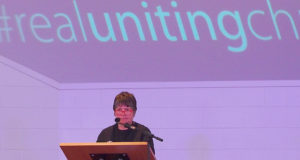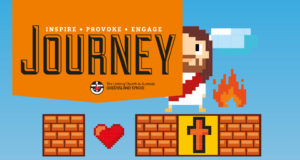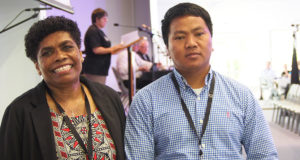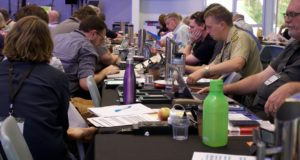In her first report to a Synod in Session as the general secretary, Rev Heather den Houting outlined a number of the activities, strategies and happenings the Synod office has been involved with over that past 18 months.
On the first day of business of the 33rd Queensland Synod, Heather called members to reflect on the duties of the Synod office.
“What does the Synod office need to do and what does it make sense for it to do?” she prompted.
Heather encouraged Synod members to read the #realunitingchurch report: A report on Synod-wide mission implementation strategies 2016–18, which collates a myriad of information on activities from across the Synod office and provides a unique overview of their operations, risks and strategic framework.
Heather said this is a working document.
“It says what is on foot, asks what you think should be on foot and what we should put down in order to do what you think we should be doing,” she said.
Heather spoke about the organisational restructure and transition in the Synod office and thanked the executive management team. She spoke of the evidence-based data that is informing some of the work and decision making for the Synod, particularly the Strategic Mission area headed up by associate general secretary Rev David Fender.
Heather said that the Synod office transition means there is no longer a department of the Synod called FAPS (Finance and Property Services), but these functions continue in other places.
Of the Risk portfolio she said: “As a church we need to make sure we are doing the right things, with the right people in the right way.”
“As part of the restructure we asked ourselves, what are the goals of the Synod office?”
The result: service, leadership, sustainability and collaboration.
Heather detailed what has happened in the past 18 months related to each of these, including work around the Royal Commission and Interim Redress Scheme, the Open data project, National Church Live Survey, disaster relief and Safe Ministry with Children.
She said as a result of the Royal Commission there is an increase in civil litigation against the Synod.
Heather said there are no leave passes when it comes to the safety of people and was unapologetic about her “hard line” on blue card and safe ministry documentation.
Heather spoke to the sustainability work by referencing improved governance by the Synod Standing Committee, an enterprise risk framework, schools and residential colleges and mission and ministries.
The collaboration goal is reflected in things like enabling the whole-of-church 40th anniversary celebration (through celebration packs), working on the UnitingWomen conference, a national Uniting Church focus on collaboration and involvement in the Recapturing our Souls conference.
A number of leadership activities were mentioned, including the leadership development framework and the graduate leadership program.
Heather flagged a lack of strategic frameworks, how we are a church in the community and unsustainability of our current funding models as challenges and risks for the church.
“Why are we in hospitals? Why are we in schools? Why are we in congregations?” she asked.
“Who are we in the world? What does it mean to have social licence to operate?”
Income source was a particular challenge.
“One major income source [UnitingCare Queensland] on which most of your activities rely (in this case 55 per cent) is a huge risk. It’s not sustainable.”
After two questions, Heather concluded the report by dispelling some myths.
She told Synod members there is no emergency fund. “It [funds] can come from somewhere, but only if we stop doing something else. The emergency fund was decimated and is now being rebuilt now.”
Another myth Heather flagged was that the church is not a business.
“We are one of the many forms of church in the world. We have all the rights, duties and obligations of a business enterprise. We must behave in a way that properly cares for our people and our assets.”
Synod members received the general secretary’s report (including reports from Finance and Property Services, Communications and marketing, Synod advisory panel on ministerial placements and the rural and remote task group) by consensus as well as a number of proposals (see exact wording below) around work around the Key Change Initiatives, particularly for the Synod office and presbyteries, as well as a focus the development of rural and remote ministry.
(b) It is proposed that the Synod:
i. Requests the Synod office develop descriptions and models for different styles of churches within its 2017-2020 Key Change Initiatives projects.
ii. Requests the Synod office, within its 2017-2020 Key Change Initiatives projects, ensures the development of resources to assist presbyteries to identify strategic locations for ongoing and future development and resourcing.
iii. Requests the Synod office devise methods that enable churches to measure the health and vitality of their worship locations as part of its Strategic Locations Key Change Initiative project.
iv. Requests that presbyteries include plans and goals for rural and remote ministry in their Strategic Locations and One Church Key Change Initiatives.
v. Supports the Board for Christian Formation (BCF) will continue to oversee the development and delivery of specific models for the development of intentional ministry in rural and remote locations.
vi. Requests the Central Queensland Presbytery develop, by the end of the year, a version of the Remote Area Ministry Project Interim Report that communicates general learning and outcomes in a manner useful for other presbyteries throughout the Synod.
 JourneyOnline
JourneyOnline







